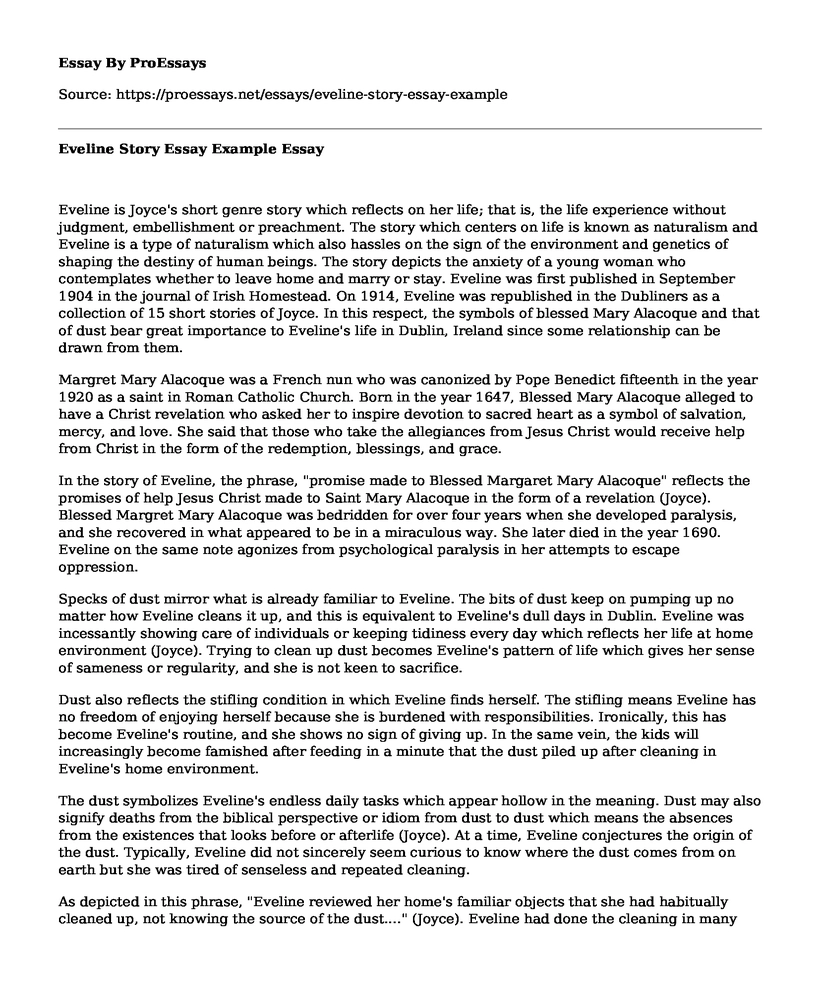Eveline is Joyce's short genre story which reflects on her life; that is, the life experience without judgment, embellishment or preachment. The story which centers on life is known as naturalism and Eveline is a type of naturalism which also hassles on the sign of the environment and genetics of shaping the destiny of human beings. The story depicts the anxiety of a young woman who contemplates whether to leave home and marry or stay. Eveline was first published in September 1904 in the journal of Irish Homestead. On 1914, Eveline was republished in the Dubliners as a collection of 15 short stories of Joyce. In this respect, the symbols of blessed Mary Alacoque and that of dust bear great importance to Eveline's life in Dublin, Ireland since some relationship can be drawn from them.
Margret Mary Alacoque was a French nun who was canonized by Pope Benedict fifteenth in the year 1920 as a saint in Roman Catholic Church. Born in the year 1647, Blessed Mary Alacoque alleged to have a Christ revelation who asked her to inspire devotion to sacred heart as a symbol of salvation, mercy, and love. She said that those who take the allegiances from Jesus Christ would receive help from Christ in the form of the redemption, blessings, and grace.
In the story of Eveline, the phrase, "promise made to Blessed Margaret Mary Alacoque" reflects the promises of help Jesus Christ made to Saint Mary Alacoque in the form of a revelation (Joyce). Blessed Margret Mary Alacoque was bedridden for over four years when she developed paralysis, and she recovered in what appeared to be in a miraculous way. She later died in the year 1690. Eveline on the same note agonizes from psychological paralysis in her attempts to escape oppression.
Specks of dust mirror what is already familiar to Eveline. The bits of dust keep on pumping up no matter how Eveline cleans it up, and this is equivalent to Eveline's dull days in Dublin. Eveline was incessantly showing care of individuals or keeping tidiness every day which reflects her life at home environment (Joyce). Trying to clean up dust becomes Eveline's pattern of life which gives her sense of sameness or regularity, and she is not keen to sacrifice.
Dust also reflects the stifling condition in which Eveline finds herself. The stifling means Eveline has no freedom of enjoying herself because she is burdened with responsibilities. Ironically, this has become Eveline's routine, and she shows no sign of giving up. In the same vein, the kids will increasingly become famished after feeding in a minute that the dust piled up after cleaning in Eveline's home environment.
The dust symbolizes Eveline's endless daily tasks which appear hollow in the meaning. Dust may also signify deaths from the biblical perspective or idiom from dust to dust which means the absences from the existences that looks before or afterlife (Joyce). At a time, Eveline conjectures the origin of the dust. Typically, Eveline did not sincerely seem curious to know where the dust comes from on earth but she was tired of senseless and repeated cleaning.
As depicted in this phrase, "Eveline reviewed her home's familiar objects that she had habitually cleaned up, not knowing the source of the dust...." (Joyce). Eveline had done the cleaning in many years around her home on the familiar objects. Her hope to the end of such suffering in the male dominated society lies in the end of her life on earth.
Conclusion
To conclude, during these years women endure male discrimination in every part of the society. Joyce uses these symbols to show what her father was expecting her to do at home on a daily basis. In those days, even in the education sector, only a few women managed to succeed in job opportunities and careers. The store generally reflects a problematic life of women in a male-dominated society.
Work Cited
Joyce, James. Eveline. Modernista, 2018.
Cite this page
Eveline Story Essay Example. (2022, May 26). Retrieved from https://proessays.net/essays/eveline-story-essay-example
If you are the original author of this essay and no longer wish to have it published on the ProEssays website, please click below to request its removal:
- Plot Overview: Othello by William Shakespeare
- Literary Analysis Essay on Hills Like White Elephants by Ernest Hemingway
- Critical Essay on Society in Dunbars "We Wear the Mask" and Piercy "Barbie Doll"
- The Yellow Paper by Gilman Charlotte - Critical Essay
- Literary Analysis Essay on A Country Doctor
- Essay Example on The American Dream: Success Through Hard Work and Sacrifice
- Odysseus: Man of Twists and Turns, Plunderer of Troy - Essay Sample







